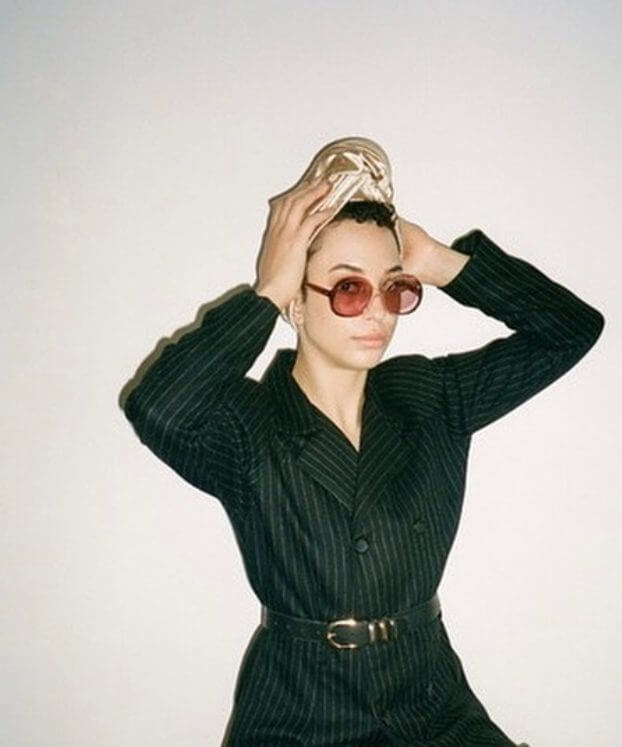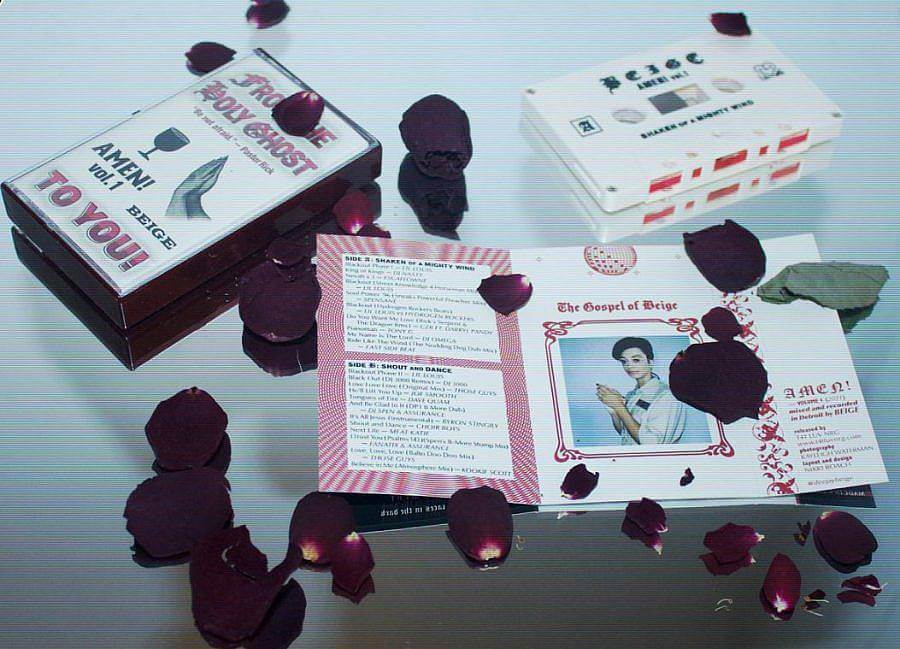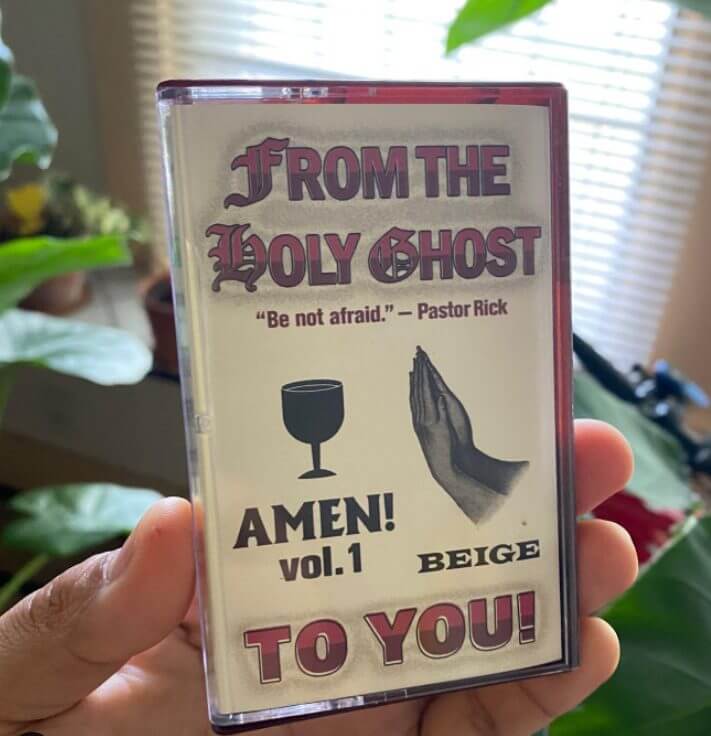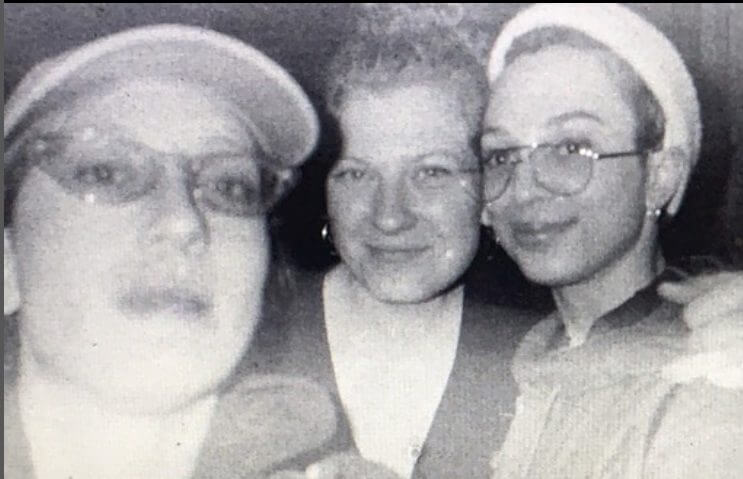Tell us a bit about yourself and what you do.
Ah, big question. I’m Beige. I’m a DJ based here in Detroit, where I’ve been living for about seven years now, and I’ve been DJing for almost that entire time, over six years now. I’m not a native of Detroit. I’m originally from the California Bay Area and I’ve lived a pretty nomadic lifestyle up until I settled in Detroit.
Now I consider this place home. I’ve put down some pretty deep roots and cultivated a community that I feel a part of here. Have an amazing house full of animals, chickens, and cats. Plus, I work at a day job as a grant writer for a small local nonprofit that I’ve also been doing for about six years called Allied Media Projects.
How would describe your approach as a music artist?
I guess I feel like that’s not a designation I’d immediately give myself. But yeah, with my music that’s just like one more manifestation of taste & art in my life. I am very picky in particular about the kind of music that I like, not just that I like, but that I collect and that I will play. That doesn’t always mean like the most refined, the most subtle, the most obscure, but it’s definitely like any music that I play. It’s not like out of a grab bag.
I’m playing it because I love it and I’m trying to make other people love it, too. I think I say the same thing about my style of playing, I guess like, the kinds of transitions that I like to do, the way I like to structure a set or interact with an audience, the way I put records together, try to juxtapose them or use them to shift energy, I think is pretty distinctive as well. I don’t think one thing almost with the same kind of approach that I took to the mixtape is like, when I’m playing, I am at least aiming for it to like. I want people to get a sense that they could only hear from me. It’s a set that I would want to dance to, that I would be going crazy for if anybody else were doing it.
How did moving to Detroit shape your beginnings as a DJ?
I did not ever really at any point like, set out to become a professional DJ. It kind of happened almost by accident.
I’ve been deeply involved and interested in dance music generally, and like, club scenes, since my late teens, but as more of a spectator or a fan or a dancer. That’s been a really important part of my life for years and years. But it never really even occurred to me to try DJing or to attempt that until after I moved to Detroit. Part of the thing that attracted me to Detroit was obviously the musical culture and the legacy here, not just being the birthplace of techno, but also obviously Motown and the city’s importance in American gospel traditions and soul music as well.

I know your beginning experience with DJ’ing originated with Detroit org Seraphine Collective.
Yeah, once I got here and started finding my place and the local scene, I happened to get connected with them, which at that time, was feminist music and art collective that had focused up until then pretty solely on the indie rock scene here in Detroit, and profiling women, primarily white women. Right when I moved here they were starting their first kind of foray into other kinds of activities. So they put on a small workshop led by Mother Cyborg and put out an open call for women and femme-identifying people–which I was at that point–to learn how to DJ and beat match on vinyl.
We covered a lot of the technical basics of how to use equipment. How to set it up and troubleshoot the basics of handling records, caring for records, playing records, all those things. But a lot of the class focused on helping us explore why we might be interested in DJing, and how to navigate starting as a DJ professionally, or just hobby-wise. As somebody who is not a man, the unique kind of hurdles or just like general bullshit that we’d have to face. We focused on exploring our musical identities, things like that. It was an amazing bonding experience, and a supportive environment to learn in.
What did your early days of DJing feel like?
I only signed up for the workshop on a whim, almost more to satisfy my curiosity of how the technical side of this art form works that I enjoy watching other people do? I want to know how they do it. I didn’t think it would go farther than that, but I loved it immediately. There’s just something incredibly satisfying and challenging about trying to take two records, which might have nothing to do with each other, and put them together, stitch them together, or collage them in a way that’s interesting or beautiful or surprising.
I bought a record player, just like a small little belt drive at first, and started collecting records, mostly just like dollar bin stuff. I listened to them, got to know them, and started practicing anywhere anytime I could. That first summer of DJing, I didn’t have a setup of my own, which is another reason that the workshop was important because they were able to provide all the equipment, and space to use it, which is like a full setup of a mixer, two turntables monitors, all the different cords and cables. That’s very expensive, not even to mention the carrying cases that are usually needed. So it’s not affordable, especially if you’re just starting out and not sure how far you’re going to go with it.
But that summer, because I didn’t have my setup of gear. I would just go over to the Trumbull Plex. They have a performance room, a loud sound system, and some busted ass turntables, and not even a DJ mixer, just like a band mixer, like a soundboard really that everything was plugged into. And I would practice beatmatching on that. Just absolutely sweltering in there, too.
Then I started getting my first gigs–very modest, barely paying gigs– and around that same time, people in the community asked me to DJ their art openings or cocktail parties or house parties, things like that. So I started even though I was not very good, started without having any particular idea of where I wanted to go with it, but just doing it because it was fun and I loved it and kept doing it. Now I’ve been doing it for six years and I’m playing Movement.
 It’s special looking back on Seraphine’s Beatmatching workshop and the impact it had on the Detroit Music Community.
It’s special looking back on Seraphine’s Beatmatching workshop and the impact it had on the Detroit Music Community.
Yeah, that program changed my life. Once it did that and I started getting more involved with Seraphine in general, I was very active for several years there, helping with fundraising, writing grants, procuring more money for more equipment, bigger class sizes, and stuff like that. It was awesome to be able not only to learn but turn around and help teach newer people like Tammy Lakkis and Haley Dukes, and a bunch of other talented people now taking the city by storm.
Speaking about community and how that builds, I’d love to hear about your relationship with Eris Drew and Octo Octa came about.
Yeah, absolutely. So the first time I met Eris and Maya and played with them was right before the outbreak of the Pandemic. I think it was February 2020. At this point, I was a pretty well-established local DJ here at various venues around town. like probably once or twice a week. I was also traveling a little, starting to do the Midwest and East Coast circuits. For some years I’ve been one of Marble Bar’s unofficial residents. They don’t have an official residency program, but I play there pretty frequently, especially to open for larger, more international touring acts. So they called me up one day, which is not unusual to open on the Detroit stop of their T4T Luv NRG tour. What was unusual about that was the booker told me that they had requested me specifically, which was very flattering and surprising because I hadn’t met them before. I had no idea how they even knew who I was. A little old me. So I never asked them.I think on every stop of their tour that they were asking venues and bookers to uplift queer people and marginalized identities, trans people, in particular, to be their supporting acts, which I think is amazing. That’s kind of like the ethos for everything they do. So they requested me and Loren, who’s another local DJ, to open for them. I was over the moon about that and poured my whole heart and soul into preparing for that three-hour opening set and met them for the first time that night.
And it’s still like one of the best party memories that I have. It was one of those nights where everything kind of came together. Like the perfect crowd, great energy, really good matching of musical styles and expression. And of course, Eric and Maya are two of the best DJs in the world and incredible to watch, but also maybe the nicest human beings I’ve ever met in my life.
That was the first time I met them. And then pretty shortly after, about a month later, the Pandemic shut everything down and we stayed in contact. They’ve both been pretty amazing mentor figures. Throughout 2020 they asked me to do a couple of streaming events. Like over the two years of the Pandemic, there was a cool streaming event, that first winter where they collaborated, T4T collaborated with another trans focus collective based out of Kansas called Untuck. Then, Eris invited me to support her Boiler Room special, which was like crazy. And then, of course, they asked me to do the mixtape. And then once everything opened back up, of course, joining all of the other kinds of label affiliates for the T4T Luv NRG weekend in New York this past February, which was a full-circle moment because it had been two years since I last opened for them.
Can you talk about the inspiration behind Amen! Vol. 1?
T4T invited me to do this mixed tape project, in December 2020, which was an amazing honor, because it was going to be the third release. So I knew right away it wasn’t just going to be like any mix. And I wanted to take my sweet time with it and be intentional about the concept, the structure, and everything included in it. They also had some pretty interesting parameters for it. They requested just to keep to mostly older records– around ten years or older. So that was an interesting limitation to work with. Although I did include a few newer tracks on there with full permission from the producers. So that meant that I had to spend several months just in prep mode, just like really digging, listening deeply. I had a lot of the records that ended up in the final version already in my collection, but just to fill it out, once I kind of settled on the idea of like, gospel rave as a concept.
I spent I don’t know how many months trying to find every gospel-related, gospel-tinged dance music record, not even sometimes dance music. Just like everything on disco, going through everything that I could, and I’m sure there’s still like so much more I didn’t even scratch the surface of. I was deep in K-hole for a while there. Then there was the arranging, the rearranging, trying to decide how I wanted the side A and side B to relate to each other, how to transition between them and just recording take after take after take. I think I got them to the final version sometime last summer. But it’s taken all that time between then and now just to get everything else lined up. The music was not the easy part, but it was only half the battle. After, came having it mastered & needing to come up with the artwork.

I worked with designer Nikki Roach on many iterations of picking out colors of the tape, the kind of case, and then ordering those things, getting test pressing. It was a really interesting glimpse into how the manufacturing and the production side of it all work. It gave me an appreciation of how much work goes into something that seems relatively simple. Eric and Maya were there every steps of the way. I have no idea how they manage to run a label with everything else.
I appreciate their hand-holding and support and willingness to let me do whatever I wanted to do concept-wise otherwise because I think the goal for me was to put together a tape that was unique, something that only I would want to do put together in a way that only I could do it. It’s very personal and I think I achieved that.
This attention to detail went into the tape’s visuals as well.
So full credit for the final product has to go to Nikki, who is just like a brilliant designer and also a research artist. I’ve worked with her over the years on a lot of different things. She’s the first person I go to if I need a flyer for her show or something like that, too. So we get each other, understand each other. We have similar aesthetic appreciations, I think. So I came to her with a concept of what I had in mind. I sent her the final mixtape to listen to, and I was like, look, kind of what I have in mind. This mix was inspired by the existing visuals of Gospel, like gospel records themselves. Not even like gospel house necessarily, but I also straight gospel, which there are a lot of them. There’s like a deep history of that in Detroit as well. My favorite record store is Hello Records, and I’ve been going there for years, and they have a big hearty gospel section. I go in and flip through these records and there’s like a distinctive artwork style. The visual language of the sleeves is usually very simple or monochromatic, with either picture of the pastor, or the choir. There are also these visual motifs and illustrations that just get repeated a lot, like praying hands, crosses doves, and things like that. I knew I wanted to pay homage to those.
Nikki and I found an archive by somebody local that’s up online. I can’t remember the name of not only records, but I think pamphlets, things like that, scanning the artwork and uploading it. So it’s like all living there, and we went through and got a lot of our visual inspiration from that. We worked for a couple more months on refining it, trying different colorways, adding things, and abstracting things to make it a beautiful physical object and piece of art that somebody would not only just listen to but be proud of having. That was important to me. And, yeah, I think we collectively knocked that out of the park.


Movement, how does it feel.
Even before I moved to Detroit, Movement loomed large in my mind as like, this Mecca for dance music and dance music culture. Even before I’d ever gone to the festival myself, the people I would know, like other friends or people in my community who are also into the music. would go to Movement and come back and just rave about it, telling me how amazing it is and how amazing Detroit is. That
helped plant the seed that brought me here. And then the first year that I went myself, the first year that I lived in Detroit, 2016 was the first year I went to movement. And that was, like, literally a month after I finished that first DJ workshop. So I was like a baby DJ, where I hadn’t even had a public gig yet, but I could at least know the basics of what people were doing up on those stages, which just made it even more impressive to me to know how hard it was because I was trying it myself. And it’s, like, really fucking difficult. So that was impressive. It did not cross my mind that I would ever, ever be one of those people. I probably would have thrown up if you told me that the idea I’d be up there on these massive stages and playing for how many, like thousands of people just boggled my mind. It still boggles my mind. I’m still really nervous. I’ll do my best. But even for the next several years, as I did start playing out Movement felt out of reach. It did seem like also at that time, I didn’t and don’t play strictly techno. I do play plenty of techno, but it’s not my only thing. It was a very pleasant surprise to be asked this year. And it was really exciting, not just, like, for me, but to see all the other locals and peers who they’ve also booked, which is a lot more both musically and demographically diverse than I’d ever seen it. So that’s gratifying to see. And I’m really happy that they thought to include me in that and that they think I have something to offer that people will like. But, yeah, I mean, it’s an institution and an absolute bucket list dream. So I’m very afraid and I’m going to do my best.

Interview composed & edited by Joan Roach.
